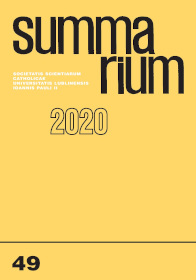Semantic inferentialism: Main ideas
Abstract
This text is a revised version of the ending of the monograph written by Kublikowski (2019). I presented it at the meeting of the Department of Philosophy of the Learned Society of the Catholic University of Lublin held on 5 February 2020. During my speech, many inspiring questions or comments were made: Prof. Zenon Roskal (KUL) – What problems are associated with inferentialism? Who noticed these problems: Brandom or the speaker? What's new here? What did Brandom contribute, and what was contributed by the speaker? Does the speaker agree with Brandom or he criticizes him? In what aspect(s) does he agree and what does he criticize? Does Brandom allude to Keith Donnellan's distinction regarding a referential and attributive use of definite descriptions? Dr Piotr Biłgorajski (KUL) – In inferentialism, an important role is played by the distinction: representationism vs anti-representationism. Inferentialism is classified as anti-representationism. Prof. KUL Anna Kawalec – What distinguishes mankind? How did we achieve success (linguistic and cognitive, etc.)? Through evolution? What is the difference between an inferential network and abduction? Dr Stanisław Majdański (KUL) – A commentary on the distinction: formality versus generality, universality or "rule-based" character (the detachment rule, etc.). Prof. KUL Zbigniew Wróblewski – Does an obligation always involve an entitlement?
References
Ajdukiewicz K., 1975, Logika pragmatyczna, Warszawa: PWN.
Ajdukiewicz K., 1985, Język i poznanie, t. 1-2, Warszawa: PWN.
Beran O., Kolman V., Koren L. (red.), 2018, From Rules to Meaning: New Essays on Inferentialism, New York–London: Routledge.
Brandom R. B., 1994/1998, Making It Explicit. Reasoning, Representing and Discursive Commitment, Cambridge, Mass.–London, England: Harvard University Press.
Brandom R. B., 1997, Replies, „Philosophy and Phenomenological Research” (numer specjalny o Making It Explicit Roberta B. Brandoma), 57 (1), s. 153-156.
Brandom R. B., 2000/2001, Articulating Reasons. An Introduction to Inferentialism, Cambridge, Mass.–London, England: Harvard University Press.
Brandom R. B., 2002a, Explanatory vs. Expressive Deflationism About Truth, w: What is Truth?, red. R. Schantz, Berlin– New York: Walter de Gruyter, s. 103-119.
Brandom R. B., 2002b, Pragmatics and Pragmatisms, w: Hilary Putnam. Pragmatism and Realism, red. J. Conant, U. M. Żegleń, London–New York: Routledge, Taylor and Francis Group, s. 40-58.
Brandom R. B., 2008, Between Saying and Doing: Towards an Analytic Pragmatism, Oxford–New York: Oxford University Press. Przekład polski: R. B. Brandom, Między mówieniem a działaniem. W stronę analitycznego pragmatyzmu, przeł. M. Gokieli, Warszawa: Wydawnictwo Naukowe PWN 2012.
Brandom R. B., 2015, From Empiricism to Expressivism: Brandom Reads Sellars, Cambridge, Mass.: Harvard University Press.
Dummett M., 1973, Frege: Philosophy of Language, Cambridge, Mass.: Harvard University Press.
Goldberg S. C., 2015, Assertion. On the Philosophical Significance of Assertoric Speech, Oxford–New York: Oxford University Press.
Grover D. L., Camp J. L., Belnap L. D., 1975, A Prosentential Theory of Truth, „Philosophical Studies”, 27, s. 73-125.
Gurova L. (red), 2012, Inference, Consequence, and Meaning: Perspectives on Inferentialism, Newcastle: Cambridge Scholars Publishing.
Kremer M., 2010, Representation or Inference. Must We Choose? Should We?, w: Weiss, Wanderer 2010, s. 227-246.
Kublikowski R., 2019, Inferencjalizm semantyczny Roberta B. Brandoma, Lublin: Wydawnictwo KUL.
Lewis D., 1983, Scorekeeping in a Language Game, w: Philosophical Papers, t. 1, New York–Oxford: Oxford University Press, s. 233-249.
Loeffler R., 2018, Brandom, Cambridge, England–Medford, Mass.: Polity Press.
Maciaszek J., 2007, Holizm znaczeniowy Kazimierza Ajdukiewicza, Łodź: Wydawnictwo Wyższej Szkoły Humianistyczno-Ekonomicznej w Łodzi.
Peregrin J., 2014, Inferentialism: Why Rules Matter, New York: Palgrave Macmillan.
Putnam H., 1981, Reason, Truth and History, Cambridge: Cambridge University Press.
Putnam H., 1983, Realism and Reason. Philosophical Papers, t. 3, Cambridge: Cambridge University Press.
Putnam H., 1988, Representation and Reality, Cambridge, Mass.–London, England: A Bradford Book–The MIT Press.
Putnam H., 1994, Words and Life, red. J. Conant, Cambridge, Mass.–London: Harvard University Press.
Putnam H., 1998, Wiele twarzy realizmu i inne eseje, przeł. A. Grobler, Warszawa: Wydawnictwo Naukowe PWN.
Putnam H., 2013, The Development of Externalist Semantics, „Theoria”, 79, s. 192-203.
Sellars W., 1953/2007, Inference and Meaning, w: In the Space of Reasons. Selected Essays of Wilfrid Sellars, red. K. Scharp, R. B. Brandom, Cambridge, Mass.: Harvard University Press, s. 3-27.
Sellars W., 1956/1991, Empiricism and the Philosophy of Mind, Cambridge, Mass.: Harvard University Press. Przekład polski: Empiryzm a filozofia umysłu, przeł. J. Gryz, w: Empiryzm współczesny, red. B. Stanosz, Warszawa: Wydawnictwa UW 1991, s. 173-257.
Stekeler-Weithofer P. (red.), 2005, „Pragmatics and Cognition” (numer specjalny pt. The Pragmatics of „Making it Explicit”: On Robert B. Brandom), 13 (1).
Szubka T., 2012, Neopragmatyzm, Toruń: Wydawnictwo Naukowe UMK.
Wanderer J., 2008, Robert Brandom, Montreal–Kingston: McGill-Queen’s University Press.
Weiss B., Wanderer J. (red.), 2010, Reading Brandom. „On Making It Explicit”, London–New York: Routledge, Taylor and Francis Group.
Wischin K. (red.), 2019, „Disputatio” (numer specjalny pt. Linguistic and Rational Pragmatism: The Philosophies of Wittgenstein and Brandom), 8 (9).
Wittgenstein L., 2000, Dociekania Filozoficzne, przeł. B. Wolniewicz, Warszawa: Wydawnictwo Naukowe PWN.
Zarębski T., 2013, Neopragmatyzm Roberta B. Brandoma, Kraków: Towarzystwo Autorów i Wydawców Prac Naukowych Universitas.
Copyright (c) 2020 Summarium

This work is licensed under a Creative Commons Attribution-NonCommercial-NoDerivatives 4.0 International License.


